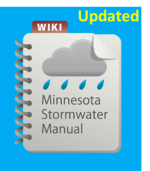
Community Assistance Package Revision as of 16:20, 17 September 2015 by Agelbmann (talk | contribs) (→Communities That Adopted MIDS)
A Federal 319 grant was awarded to the Washington Conservation District to develop and pilot a Community Assistance Package (CAP) and provide a real testing ground for the application of the new MIDS performance goals, credits and calculators. The pilot community project involves regional and focused community assistance in the form of education, training, review and consultation services, and tools and resources such as ordinance goals. Education and training includes NEMO-Nonpoint source Education for Municipal Officials and Stormwater U-technical training for staff and consultants.
Four pilot communities were selected in the St. Croix Basin-Centre City, Chisago, Lindstrom and East Bethel. These communities received free education, training and consulting services to update plans, ordinances and codes to protect their local water resources and ultimately the St. Croix River.
A Community Assistance Package (CAP) was submitted to the MPCA and the MPCA has completed it's review. The package includes performance goals, a calculator for determining stormwater credits for best management practices and ordinance guidance for communities. Use of the MIDS CAP can help a community measure progress toward water and natural resource protection and restoration goals.
File:Community assistance package.pdf
Contents
Communities That Adopted MIDS
Valley Branch Watershed District: In December, 2013, Valley Branch Watershed District amended their stormwater rules to include the MIDS performance goals and Design Sequence Flow Chart. Cities affected by this rule include: White Bear Lake, Maplewood, North St. Paul, Mahtomedi, Pine Springs, Grant, Oakdale, Lake Elmo, Oak Park Heights, Baytown Township, West Lakeland Township, Woodbury, Afton and St. Mary's Point. For more information, contact John Hanson, Valley Branch District Administrator at 952-832-2622 or jhanson@barr.com. The revised rules can be found on the Valley Branch Watershed District's web site
Riley Purgatory Bluff Creek Watershed District. The District adopted new rules, effective January 1, 2015 that include the MIDS performance goals. Cities affected by this rule include: Bloomington, Chanhassen, Deephaven, Eden Prairie, Minnetonka and Shorewood. The revised rules can be found on the Riley Purgatory Bluff Creek Watershed District web site
Ramsey Washington Metro Watershed District adopted the MIDS performance goals effective April 1, 2015. Cities affected by this rule include: Shoreview, Roseville, White Bear Lake, Vadnais Heights, Gem Lake, Landfall, Little Canada, North St. Paul, Maplewood, Oakdale, Woodbury and St. Paul. Contact Tina Carstens at 651-792-7950 or tina.carstens@rwmwd.org or go to the Ramsey Washington Metro Watershed District web site
Capitol Region Watershed District adopted the MIDS performance goals in April. Cities affected by this rule include Falcon Heights, Lauderdale, Maplewood, Roseville and St. Paul. Contact Forrest Kelley at 651-644-8888 or forrest@capitolregionwd.org or go to the Capitol Region Watershed District web page
The City of Woodbury adopted the MIDS performance goals on April 8th. Contact Sharon Doucette, City of Woodbury's Environmental Resource Coordinator at 651-714-3538 or sdoucette@ci.woodbury.mn.us
Rice Creek Watershed District added the MIDS performance goals to their watershed district rules. For more information, contact the Rice Creek Watershed District permit coordinator, Nick Tomczik at 763-398-3079 or ntomczik@ricecreek.org.
The Mississippi Watershed Management Organization has incorporated the MIDS performance goals into their Watershed Management Organization rules. For more information, contact Stephanie Johnson, Programs Principal at Mississippi Watershed Management Organization: 612-465-8780 or sjohnson@mwmo.org
The City of Blaine updated their stormwater ordinance to specify the MIDS performance goals as the method of meeting stormwater management, calling out LID best management practices and references the Minnesota Stormwater Manual for guidance. The City also updated it's local surface water management plan to be consistent with the MIDS performance goals. For additional information, please contact Jim Hafner, City of Blaine Stormwater program manager at JamesH@ci.blaine.mn.us
The Bassett Creek Watershed Management Commission adopted the MIDS community assistance package as part of their 2015 Watershed Management Plan. Policy 12 and Policy 32 of the plan specifies that the Commission requires all stormwater to be treated in accordance with the MPCA's MIDS performance goals. For more information, contact Laura Jester, Administrator of the Bassett Creek Watershed Management Organization at laura.jester@keystonewaters.com or 952-270-1990
The City of Eagan incorporated the MIDS performance goals, calculator and flexible treatment options into their stormwawter management regulations. Contact Gregg Thompson, Water Resources Specialist at 651-675-5335 or gthompson@cityofeagan.com
Communities that are planning to adopt MIDS
The Middle St. Croix Watershed Management Organization was awarded a Clean Water grant in 2014 to implement the MIDS Community Assistance Package. The watershed management organization will work with up to 13 communities in the St. Croix Basin to adopt ordinance and code revisions to incorporate MIDS stormwater quality and volume standards for new development and redevelopment. Contact Mikael Isensee, Administrator of the Middle St. Croix at 651-330-8220 extension 22 or misensee@mnwcd.org.
Through a Targeted Watershed Demonstration Grant from the Board of Water and Soil Resources, the Crow Wing Soil and Water Conservation District is working with the City of Crosby, City of Deerwood and Irondale to incorporate MIDS into their local ordinances. Contact Melissa Barrick at 218-828-6197 or melissa.barrick@crowwingswcd.org
Chisago Lakes Improvement District plans to adopt the MIDS community assistance package in the spring of 2015. Cities include Chisago City, Centre City and Lindstrom. Contact Jerry Spetzman at 651-213-8383 or jpspetz@co.chisago.mn.us.
Communities within the Stearns County Soil and Water Conservation District, including Watab Township, LeSauk and St. Joseph are considering adoption of the MIDS Community Assistance Package. Contact Wayne Cymbaluk at wayne.cymbaluk@mn.nacdnet.net for more information
Other Ways the MIDS Performance Goals are being used
The Minnesota Department of Natural Resources has incorporated the MIDS performance goals into their Stormwater and Shoreline Best Management Practices for Public Water Accesses
The Minnesota Buildings, Benchmarks & Beyond (B3) Guidelines has incorporated the MIDS performance goals into the site and water guidelines. The B3 Guidelines are required on all projects that receive general obligation bond funding from the State of Minnesota. For detailed information, go to The B3 Guidelines for Stormwater Management
